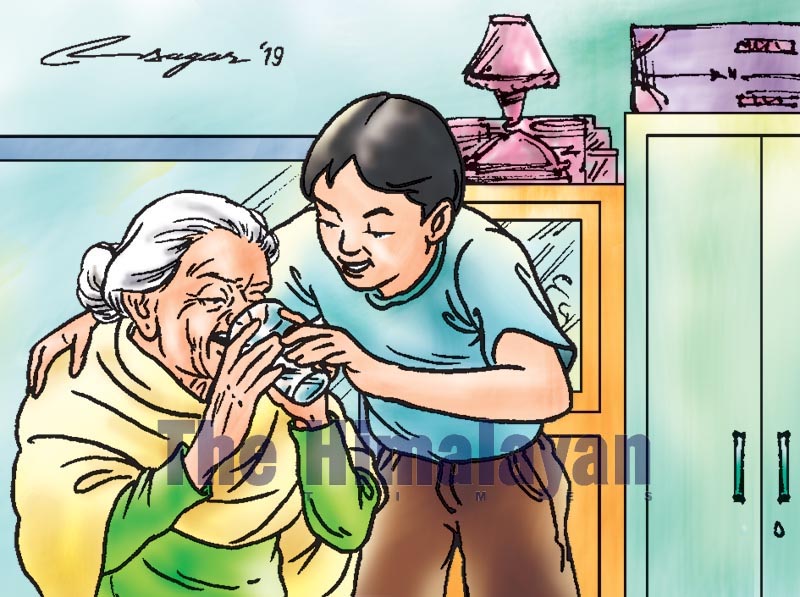Int’l Day of Older Persons: Plan for longer lives
Empowering older persons in all dimensions of development, including promoting their active participation in the social, economic and political lives, is one way to ensure their inclusiveness and reduce inequalities
At the outset, I would like to borrow words from the famous American poet Samuel Ullman, who said, “Years may wrinkle the skin; but to give up enthusiasm wrinkles the soul”.
We are aging - not just as individuals or communities but as a world. According to World Population Prospects, by 2050, one in six people in the world will be over 65 years (16%), up from one in 11 in 2019 (9%). In 2018, for the first time in history, persons aged 65 or above outnumbered children under five years of age globally. The number of persons aged 80 years or over is projected to triple, from 143 million in 2019 to 426 million in 2050.
The 60-plus population of Nepal currently constitutes around nine per cent of the total population, which is expected to rise to 11 per cent by 2030 and to a historical 18 per cent by 2050.
The major question which we should ponder over is, “Are we prepared for the health and socio-economic challenges of this greying society?”
Nepal like other developing countries has also been witnessing a paradigm shift in the epidemiology of illnesses in the recent years, from communicable to non-communicable diseases (NCDs) like diabetes, hypertension, cancer and chronic respiratory illnesses. With the rise in disabilities attributable to these NCDs, the demand for long-term care also has been on the rise.
Owing to the paucity of resources, lack of concrete strategies, the concept of formal long-term care (LTC) has not yet materialised in this region. The LTC sector is widely informal and is mostly relying on the family-based system, which is largely handled by the sub-optimally skilled family members, resulting in the compromise of the rights of the frail, dependent, older individuals to quality post-acute and long-term care.
Similarly, in our society, where the older adults are regarded as ‘gods’, issues like elder abuse and violence are unbelievably on the rise.
The theme of the 2019 celebration is “The Journey to Age Equality”. The 2019 theme is aligned with Sustainable Development Goal (SDG) 10 and will focus on pathways of coping with the existing and preventing future old age inequality. SDG 10 sets to reduce inequality within and among countries and aims to “ensure equal opportunity and reduce inequalities of outcome,” including through measures to eliminate discrimination, and to “empower and promote the social, economic and political inclusion of all, irrespective of age, sex, disability, race, ethnicity, origin, religion or economic or other status.”
We all should acknowledge the existence of old age inequality, resulting from a cumulation of disadvantages throughout life. In our country, factors like minimal state provision for the economically fragile older adults, limited affordability to quality health care, limited universal health coverage, limited material and human health resources for old age care, degenerating family structure from joint to nuclear, old-age unfriendly health set-ups, unfriendly cities and environments, intergenerational gap in access to the rapidly developing technologies, ageism in research and health delivery have been emerging as potential challenges. For this, appropriate policies should be shaped, which would potentially address the causes behind the inequalities related to the health care of old age. Adding prevention, promotion and rehabilitation with equal importance to the widely practised curative spectrum of health care, developing sustainable universal health coverage strategies would help to alleviate sufferings in old age.
Similarly, the intergenerational risk of increased old age inequality should be highlighted. We should all be aware about the urgency of coping with existing old-age inequality and preventing it in the future. Societal and structural changes in view of life course policies - life-long learning, proactive and adaptive labour policies, social protection and universal health coverage - should be explored. It would help in reflecting on the best practice, lessons and progress on the journey to ending older age inequality and changing negative narratives and stereotypes involving “older age”.
People are living longer and, in some parts of the world, healthier lives. This represents one of the crowning achievements of the last century but also a significant challenge. Longer lives must be planned for. Societal aging may affect economic growth and many other issues, including the sustainability of families, the ability of states and communities to provide resources for older citizens, and international relations. There must be an understanding that demography matters for sustainable development, and that population dynamics will shape the key developmental challenges that the world is confronting in the 21st century.
The 2030 Agenda and the Sustainable Development Goals (SDGs) recognise that development will only be achievable if it is inclusive of all ages.
Empowering older persons in all dimensions of development, including promoting their active participation in the social, economic and political lives, is one way to ensure their inclusiveness and reduce inequalities.
On this day, all the stakeholders and the civil society should come forward to formulate strategies to combat ageism and inequality in health and every other sector for dignified, happy and healthy ageing.
Dr Kandel is a consultant geriatrician






